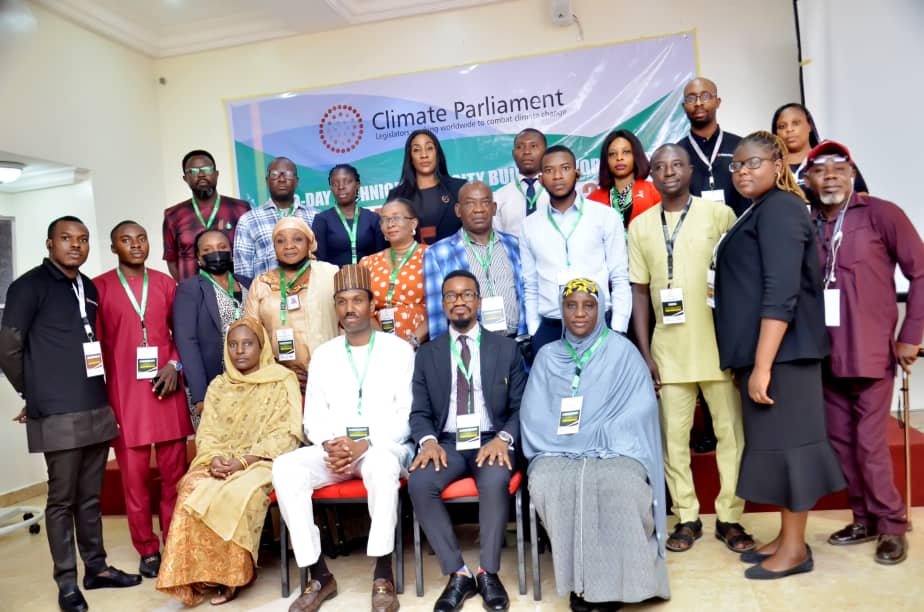Chuks Oyema-Aziken
Secretary General, Climate Parliament, Nick Dunlop, has warned that Nigeria’s temperature could hit 29 degree mean average temperature if all hands are not on deck to tackle climate change.
Dunlop said with over 200 million population, projected to increase to almost 400 million by 2050, low adaptive strategies, and increasing temperatures, droughts, and floods, Nigeria is highly vulnerable to climate change.
He stated this in his opening remarks at the Climate Parliament Two-Day Technical Capacity Building Workshop on the Climate Change Act 2021 in Abuja.
According to him, “This temperature is found in the hottest places of the Sahara desert. It is completely unliveable. The human body is unable to be sustained in this temperature.
“For millennia, human populations have resided in areas with a mean annual temperature (MAT) ranging between 11 °C and 15 °C. Production of crops and livestock has been largely limited to this temperature niche.
“A recent study shows that, in a business-as-usual climate emissions scenario, this temperature niche will shift more over the coming 50 years than it has changed in the last 6,000 years. Populations will be forced to migrate to escape the heat. If migration was not possible, one third of the global population is projected to experience a MAT above 29 °C, currently found in only 0.8% of the Earth’s land surface, mostly concentrated in the Sahara.
“For each additional degree Celsius of temperature increase, one billion people will find themselves living in areas that are simply too hot to sustain agriculture, livestock and human life without air conditioning.
“For the first time, the Climate Change Act 2021 provides a legal framework aimed at promoting the mainstreaming of climate change actions, a system of carbon budgeting, and realising low carbon and climate-resilient Nigeria.
“It is important to note that although the Legislature is crucial to driving political will, without the support of the Executive – through the Ministries, Departments, and Agencies – and the Judiciary, the legislation so enacted may remain in the books and lack social implementation.
In his speech, Chairperson of the Climate Parliament and federal lawmaker, Sam Onuigbo, noted that Nigeria’s loudest statements on Climate Change were the country setting 2060 to attain net-zero and. Mr President signing the Climate Change Act.
“To see the Act not being implemented with the inauguration of the Council even when there is a clear timeline for certain things to be done, as stipulated in the Act, should be a source of concern to Nigerians,” he lamented.
National Coordinator of the Climate Parliament Nigeria, Dr Nkiruka Chidia Maduekwe, said the delay in establishing the council will lead to a setback and slow momentum in the fight against Climate Change because it is the number one vehicle through which the Climate Change Act will be implemented.
She said, “what we are doing here is very essential with regards to pushing for the implementation of the Climate Change Act 2021 and the technical capacity building workshop aims to inform and create awareness with the members of parliament and key ministries listed as members of the national council.”
Dr Maduekwe said the awareness and reawakening of the knowledge of what each stakeholder’s role in the overall scheme of things with regards to the implementation of the Act.
“We are supposed to have the had the national council on Climate Change established but up to now, it has not been inaugurated and that is stalling a lot of things because that council is also going to inform the approval of the carbon budget that the Ministry of Environment and the Ministry of Budget and National Planning are supposed to create hand in hand.
“What needs to be done is the inauguration of this council and the time to do it is now not yesterday because we need to ask ourselves what is Nigeria bringing to the table come COP 27,” she adds.
The Minister of Environment, Mohammed Abdullahi, in an address stated that Climate Change is the biggest challenge faced by the present generation.
The minister represented by the Deputy Director, Department of Climate Change, Dr. Aliyu Yauri stressed that it is essential to provide improved technical directions for the implementation of the newly signed National Climate Change Act.
“Without doubt, Climate Change is no longer a distant threat; it is a reality and a sign of what lies ahead. Climate Change is perhaps the biggest challenge faced by our generation.
“The Technical Working Capacity Building Workshop is highly commendable as this would help to strengthen the capacity and capabilities of future professionals in the field of Climate Change and Climate Science.
The Climate Parliament is an international multi-partisan network of legislators working to fight climate change, create awareness of climate threats and affordable alternatives to carbon-intensive development, and promote the transition to renewable energy.
In March 2022, the Climate Parliament established a dedicated Secretariat in Nigeria with the mandate to engender Parliamentary Action on Renewable Energy (PARE). The objective is to galvanise National Assembly members’ interest in providing the requisite support system for a decarbonised, low carbon, and climate-resilient Nigeria. Given the Legislature’s critical role in driving political will, awareness creation and exposure to the varied aspects of the climate agenda are imperative for realising this objective.



